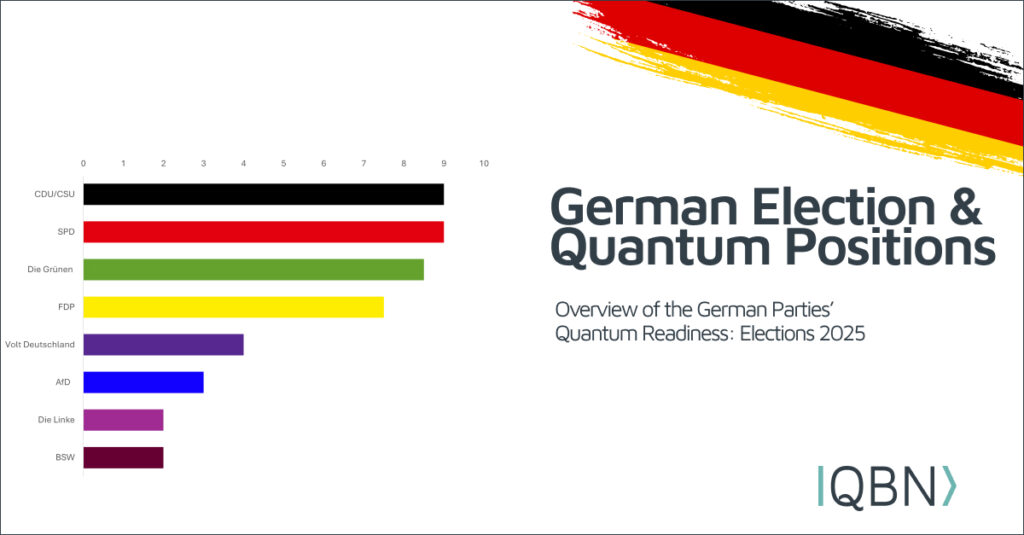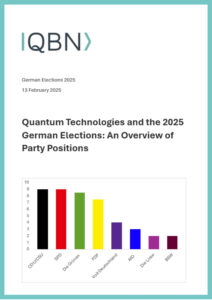As the 2025 German federal election approaches, the future of quantum technologies will play a pivotal role in shaping Germany’s technological landscape. For the quantum industry, this election represents a critical moment in determining the direction of Germany’s and Europe’s quantum industry, including public policy, investment, and international collaboration in quantum research, development, and industry adoption. The next government will influence the scalability, focus, and development pace of Germany’s national quantum initiative, the regulatory environment, and the resources allocated to quantum technologies, including their utilization, integration, and application, to unleash their potential to revolutionize multiple industries, from AI and communications to healthcare, defense, finance, and energy.
Understanding the electoral programs of major political parties is crucial for anyone interested in the future of quantum technologies. Quantum technologies are not only important for economic growth and scientific progress but are also becoming a key strategic asset with significant implications for national security, competitiveness, and technological independence. The policies proposed by political leaders will play a vital role in shaping Germany’s position as a global leader in quantum innovation.
The Quantum Business Network (QBN) believes that the quantum sector requires clear, ambitious, and consistent policies that encourage investment, foster international partnerships, support technology transfer, and accelerate industry adoption for quantum technologies, particularly quantum computing, quantum sensing, quantum cryptography, and quantum communications. With global competition intensifying, Germany’s political leadership will need to ensure that the country remains a strong player in the international quantum race. The parties’ positions on quantum technologies are therefore crucial for shaping the future of Germany’s innovation ecosystem and its leadership in the rapidly evolving quantum space.
As we approach the election, it is important for all stakeholders in the quantum industry to familiarize themselves with the different political platforms and how they plan to address the future of quantum technologies. By understanding the varied approaches, we can better navigate the policy landscape and advocate for the right kind of support for the quantum industry.
QBN has prepared an overview of the election manifestos of each major party’s stance on quantum technologies, offering insights into how they envision Germany’s role in the global quantum economy. We hope this will help our esteemed community of quantum industry professionals, researchers, and policy influencers make informed decisions and actively engage in shaping Germany’s quantum future.
The analysis was conducted based on criteria such as commitment to technology transfer, industry adoption, and fostering private investments. These factors are crucial in determining the results. It is important to note that there is significant tolerance in the scoring, depending on the criteria and their respective weights. QBN does not provide any advice on how to vote but encourages everyone to read the programs thoroughly and vote on an informed basis, keeping in mind the bright future of the German and European quantum industry for the common good.
Christian Democratic Union (CDU)/Christian Social Union (CSU)
The CDU/CSU aims to position Germany as a leader in quantum computing and other high-tech fields through a strong focus on research, innovation, and technology transfer. Their vision includes a High-Tech Agenda that prioritizes quantum computing, aerospace, and AI. They propose increasing research and development investment to 3.5% of GDP by 2030 and making Germany an innovation hub. The party advocates for reduced bureaucracy, better support for startups, and a federal digital ministry to streamline technological advancements. Their policy emphasizes market-driven solutions, fostering entrepreneurship, and leveraging quantum computing for economic growth and national competitiveness.
Social Democratic Party (SPD)
The SPD’s 2025 electoral manifesto prioritizes fostering innovation, particularly in AI and quantum technology, to drive Germany’s economic and social progress. They advocate for stronger research funding, reduced bureaucracy, and better support for turning research into market-ready products. Quantum computing, robotics, and next-generation network technologies are key focus areas. The SPD also supports expanding AI ecosystems, investing in computational infrastructure at universities, and ensuring fair career opportunities in science. On a European level, they back a robust research framework (FP10) and improved funding regulations. Their vision includes strengthening education, addressing skill shortages, and integrating more professionals into the workforce.
Alliance 90/The Greens
The Alliance 90/The Greens advocate for a strong European economy driven by technological innovation, including quantum technology. They emphasize the need for deeper European cooperation in research and development to maintain global competitiveness, particularly against the U.S. and China. Their vision includes fostering cutting-edge advancements in key areas such as AI, quantum technology, microchips, and biotechnology. They support the expansion of production capacities for critical technologies and the creation of a robust digital and research ecosystem in Europe. Their vision includes increasing research funding to at least 3.5% of GDP, supporting both fundamental and applied research, and improving the transition of scientific breakthroughs into market-ready products. They aim to enhance cooperation between science, industry, and society through initiatives like the German Agency for Transfer and Innovation (DATI) and the Federal Agency for Disruptive Innovation (SPRIND).
Additionally, the Greens stress the importance of sustainable finance, industrial modernization, and regulatory frameworks that encourage innovation while ensuring climate neutrality.
Free Democratic Party (FDP)
The FDP (Free Democratic Party) emphasizes the importance of advancing quantum technology as part of its broader vision for Germany’s future in research and innovation. They aim to strengthen Germany’s position as a global leader in scientific fields like quantum physics, ensuring its continued leadership in fundamental physics research. The party plans to foster a technology-neutral environment for research and promote dual-use technologies that can benefit both civilian and military applications. Specifically, the FDP calls for improvements in the legal framework surrounding cutting-edge scientific fields such as quantum technology, alongside reforms to foster innovation and attract top researchers. The FDP supports the creation of a European equivalent to DARPA (Defense Advanced Research Projects Agency), focusing on the transfer of technological advancements to both military and civilian sectors. By ensuring scientific freedom and an optimized research environment, the FDP envisions a strong future for quantum technology and other high-tech sectors in Germany.
Volt Deutschland
Volt Deutschland’s vision for quantum technology aligns with its broader focus on fostering innovation, technological sovereignty, and European cooperation. While the party does not explicitly mention quantum technology in its 2025 election program, its commitment to key enabling technologies—such as artificial intelligence, biotechnology, and new materials—suggests an overarching strategy that would likely include quantum advancements.
Volt advocates for a European approach to technological development, arguing that joint EU funding and cooperation are necessary to compete with major global players like the U.S. and China. The party also supports increasing tax incentives for research and development, fostering a strong startup culture with public investments and venture capital, and integrating innovation hubs into existing research institutions.
Given these priorities, Volt’s policies would likely create a supportive environment for quantum technology development by promoting cross-border collaboration, securing research funding, and ensuring that emerging technologies contribute to economic growth, sustainability, and social progress.
Alternative for Germany (AfD)
The Alternative for Germany (AfD) party’s manifesto for the 2025 elections outlines a strong commitment to fostering technological innovation and restoring Germany’s global competitiveness in key industries. They advocate for a technology-neutral approach to economic development, supporting various sectors, including traditional industries like automotive and engineering, and modern high-tech industries such as dual-fluid nuclear technology, nanotechnology, space technology, and artificial intelligence (AI).
The manifesto stresses the importance of maintaining Germany’s industrial prowess while supporting advancements in high-tech sectors, emphasizing the need for a dynamic and diversified technological landscape. The AfD envisions an environment where Germany leads in both traditional industries and future-oriented technologies. Overall, the AfD has not placed significant emphasis on quantum technologies in their electoral platform. Their broader focus on nationalism and skepticism toward international cooperation may suggest a more cautious approach to global scientific collaboration in the quantum space. For the quantum industry, this lack of clarity presents a challenge, as the development of quantum technologies thrives in an environment of collaboration and international research partnerships.
The Left (Die Linke)
The Left Party (Die Linke) does not explicitly mention quantum technology in its economic and industrial policy. However, their broader vision for technological and economic transformation emphasizes state-led investment in innovation, particularly in sustainable and socially just industries. They advocate for a €200 billion investment fund to support industry transition, with a focus on climate-friendly technologies, regional economic cycles, and public ownership of key industries. Their policy framework prioritizes long-term state involvement in strategic sectors, ensuring that technological advancements align with social justice, environmental sustainability, and economic democracy.
This approach suggests that the development of quantum technology in Germany would likely be shaped by strong public investment, strategic state guidance, and an emphasis on socially and environmentally responsible applications, potentially prioritizing research and development that aligns with broader societal and economic goals rather than purely market-driven interests.
Bündnis Sahra Wagenknecht (BSW)
The Bündnis Sahra Wagenknecht (BSW) party’s political manifesto does not explicitly address quantum technology. However, their broader innovation and industrial policy emphasizes the strategic importance of technological advancements. They advocate for a significant increase in research and development funding, aiming to raise investment in innovation to at least 4% of GDP by 2030. The party supports state-backed funding for key industries and innovative startups, emphasizing “patient capital” that prioritizes long-term technological progress over short-term financial returns. Their vision includes fostering technological advancements that contribute to societal and environmental goals, ensuring that Germany remains competitive in critical future industries.
Conclusion
Germany’s political landscape reflects a diverse range of perspectives on quantum technology, from strong commitments to research funding and innovation ecosystems to a lack of explicit focus on the field. While parties like the CDU/CSU, SPD, Greens, and FDP emphasize quantum technology as a strategic priority, advocating for increased investment and fostering innovation, others, such as AfD, Die Linke, and BSW, take a broader approach to technological development without explicitly highlighting quantum advancements. Volt Deutschland aligns with a European vision for innovation, likely supporting quantum initiatives through cross-border collaboration.
For QBN, this underscores the importance of continued advocacy for quantum technology as an essential pillar of Germany’s future competitiveness, sovereignty, and security. Ensuring strong political and financial support across party lines will be crucial in positioning Germany as a global leader in quantum technologies and related fields.
This overview aims to help stakeholders understand the political positions shaping the future of quantum technologies. As these advancements are set to transform industries and economies in the coming decades, the decisions made in the upcoming election will have lasting effects on Germany’s role in this technological revolution. By staying informed, individuals and organizations can help shape policies that support progress and maintain Germany’s leadership in the quantum sector.
Download Paper: Quantum Technologies and the 2025 German Elections – An Overview of Party Positions
About QBN
QBN is the world’s leading business network with more than a 100 members that promotes networking, business creation and the development of organizations working in the field of quantum technologies and its value chains. We provide our members with growth acceleration and technological advancements through industry collaborations, deep market insights, increased visibility and supportive structures, business development, technology transfer and innovation support as well as entrepreneurial mentoring and fast access to private and public funding.
In our working groups on quantum computing and applications, quantum communications, quantum sensors and diamond quantum technologies as well as with our standardization and unique networking activities, we bring together people from industry, science and politics, connect them with the entire value chain and provide them a supportive platform to build a strong Quantum Industry together.
Contact
Dipl.-Phys. Johannes Verst, CEO
Quantum Business Network UG
Fürkhofstr. 9, 81927 Munich, Germany




